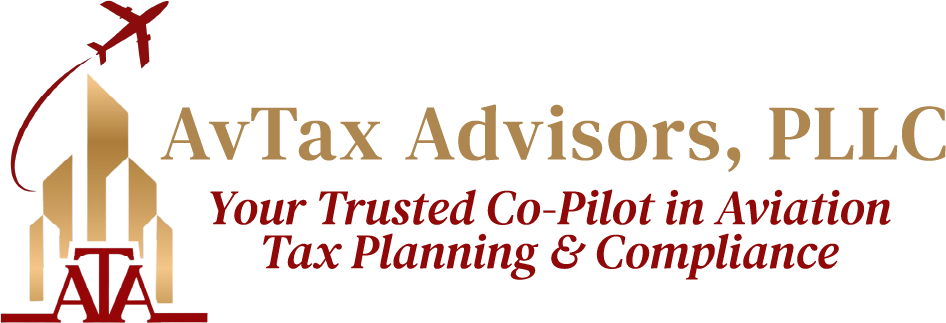Buying an aircraft is a big decision, and so is how you hold title to it. Whether you’re purchasing a plane for business, personal use, or a combination of both, forming the right ownership entity can make a meaningful difference. At AvTax Advisors, PLLC, we help aircraft owners set up the proper structure from the start—one that fits your tax goals, limits liability, and protects your privacy.
What Are the Options for Aircraft Ownership Entities?
There’s no one-size-fits-all structure for owning an aircraft. We help you understand your options and choose what makes the most sense based on how and where the aircraft will be used.
Common ownership structures include:
- Limited Liability Companies (LLCs): These offer flexibility and pass-through taxation, which can reduce your overall tax burden. They’re widely used for both personal and business aircraft.
- Corporations (S-corp or C-corp): These may work well for businesses that use aircraft in their operations or lease them to others. S-corps pass through profits; C-corps may provide corporate-level benefits but require more upkeep.
- Trusts: These are often used for privacy, estate planning, or compliance with FAA citizenship rules. A Delaware Statutory Trust, for example, can offer anonymity while meeting regulatory requirements.
We walk you through the pros and cons of each structure and tailor your setup to meet your needs.
How Can You Keep Your Aircraft Ownership Private?
Aircraft ownership can attract attention, sometimes unwanted. That’s why privacy matters to many of our clients. Certain entity structures and filing locations offer more confidentiality than others.
For example:
- States like Delaware and Wyoming allow owners to form LLCs without public disclosure of member names.
- Using a registered agent helps keep your address off public records.
- Trust structures can further shield ownership details from public view.
We help you choose the right mix of tools to maintain your privacy without cutting corners.
What Is a Double-Blind Trust and Do You Need One?
For those who need an even greater level of confidentiality, a double-blind trust may be the answer. This structure separates the person who creates the trust (the grantor) from the person or entity managing it (the trustee), with neither having full visibility into the other’s identity.
These trusts are typically layered with additional entities, such as a corporate trustee or LLC, making it even harder to trace beneficial ownership through public databases.
We’ve worked with high-net-worth clients, celebrities, and public figures who need this kind of discretion. If privacy is your top priority, we can design a structure that works.
How Do Different Entity Structures Affect Taxes?
How your entity is formed can directly impact your taxes, now and in the future. Choosing the wrong structure may limit your ability to deduct operating costs, trigger unnecessary sales or use tax, or even expose you to federal excise tax (FET) when leasing your aircraft.
Here’s what we consider when evaluating your options:
- Whether the entity allows for pass-through taxation to avoid double taxation.
- Whether aircraft-related expenses (like fuel, hangar fees, or depreciation) can be deducted.
- Whether your structure increases your chance of being flagged for an audit.
- How the FAA and IRS will view your usage pattern: personal, business, or mixed use.
We don’t just form entities. We design them with long-term tax efficiency in mind.
Should You Form Your Aircraft Entity in Florida or Another State?
Florida offers some favorable conditions for aircraft owners, but there are still traps to avoid. For example, improperly titling your aircraft can trigger unexpected use tax obligations, even if the transaction seems exempt at first glance.
We also help clients consider:
- Whether forming in another state offers stronger privacy protections or tax savings.
- Where the aircraft will be based and operated, since state tax laws vary by location.
- How state residency and business use factor into exemptions or liabilities.
We’ve helped Florida residents and out-of-state clients structure ownership that aligns with both their flight plans and their financial goals.
What Can You Expect From Us?
We make the formation process straightforward and efficient. Here’s what it typically looks like:
- Initial consultation – We discuss your aircraft usage, goals, and privacy needs.
- Entity recommendation – We propose a structure that fits.
- Formation and documentation – We handle all filings and registration steps.
- Compliance support – We provide ongoing guidance to keep you in good standing.
The entire process usually takes several weeks, depending on the structure’s complexity and how quickly decisions are made. We coordinate with your title company, aircraft manager, or CPA to make the process seamless.
Contact an Experienced Florida Aviation Entity Formation Attorney
If you’re considering forming an entity for aircraft ownership, we’re here to help. At AvTax Advisors, PLLC, we work with clients across Florida and beyond to create ownership structures that align with your goals and protect what matters. Reach out today for a consultation.

